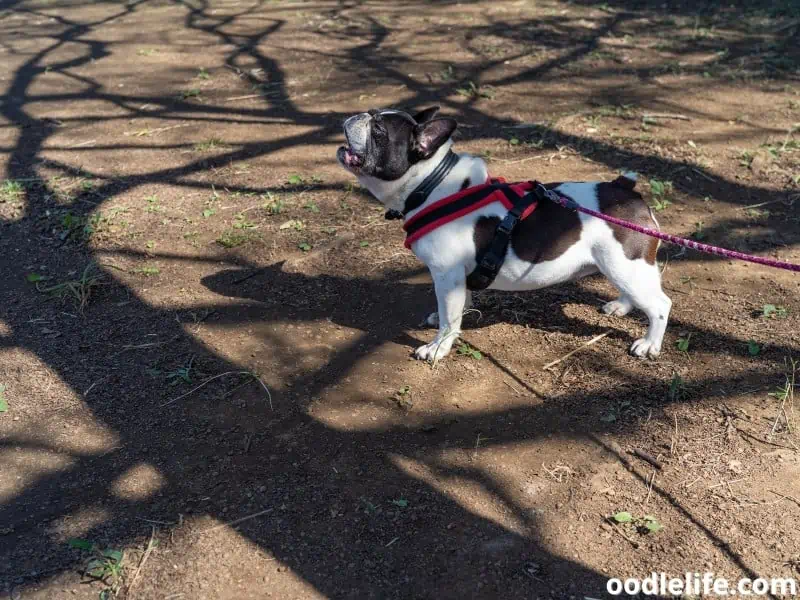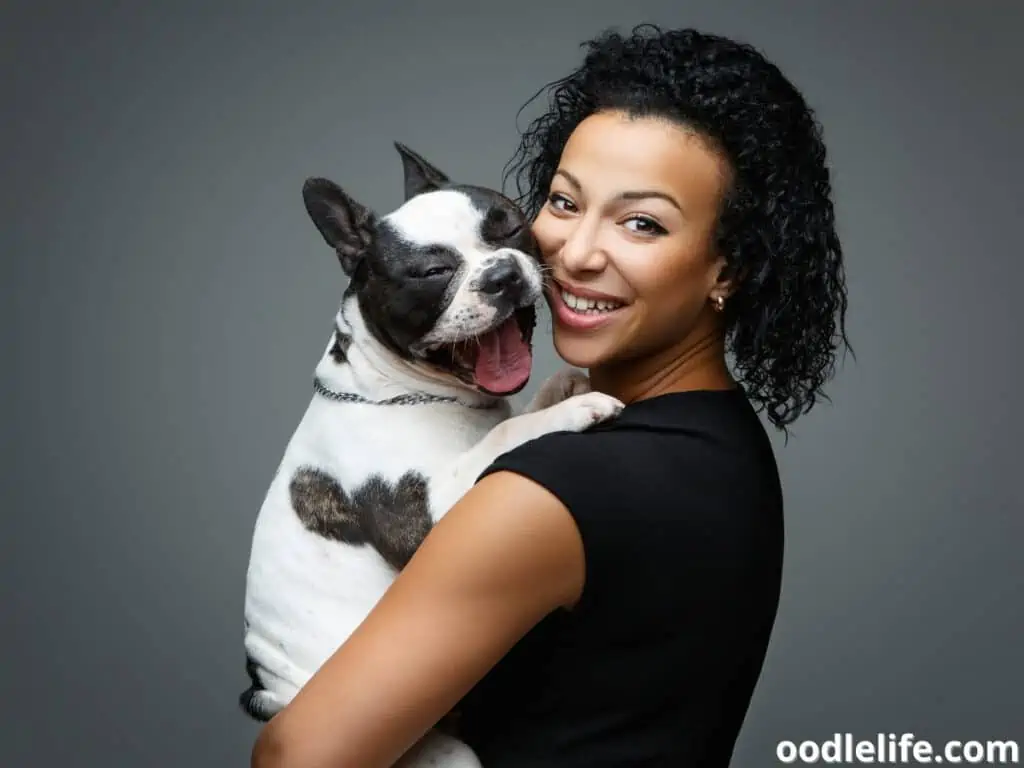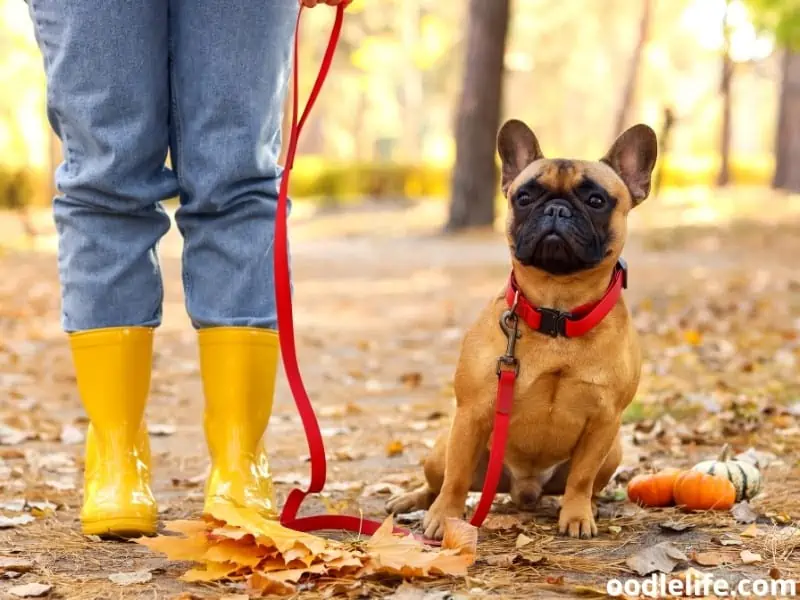Do French Bulldogs BARK a Lot?
With their stocky build and squished faces, French Bulldogs are one of the most popular breeds in the world. They suit all kinds of households, even those with small children and owners.
Because of their small sizes and moderate energy levels, they also will suit owners that live in apartments. Noise is a common concern in small living spaces like cities and apartments, and you certainly don’t want neighbors that are annoyed by a dog’s constant yapping. Or worse, get kicked out of your apartment building!

The good news is that French Bulldogs are not known to be excessive yappers. In this blog post, we’ll look at the reasons why French Bulldogs bark, and what you can do about it.
Why Do French Bulldogs Bark?
Frenchies are not known to bark for no reason, so if they are barking more than usual then there is something triggering them to bark a lot, or they are trying to communicate with you to express a need.
Hunger, anxiousness, loneliness, and fear all could be reasons for your Frenchie barking uncontrollably. Once you figure out what is disturbing your pet, you will be able to solve the problem and reduce your Frenchie’s barking.
French Bulldogs are susceptible to separation anxiety, which can trigger excessive barking for attention, but most French Bulldogs will sleep it off until their owner arrives instead of barking.
French Bulldogs will start being vocal from about two to three weeks but proper barking will not start until around 16 weeks of age. For this reason, the environment your French Bulldog is in during their first eight weeks of life is very important.
If they are around loud, non-stop barkers in that period, their personality will develop in the same way and they will most probably end up being needless barkers as well. It is best to keep your Bulldog in a calm and collected environment until they are about two to three months old.

Here are some reasons your French Bulldog might be barking more than usual:
1. Separation Anxiety
Dogs are social creatures that thrive on companionship. When they are left alone, it’s not unusual for them to experience separation anxiety. Barking is one of the most common symptoms of separation anxiety in dogs.
If your dog only starts barking when you leave the house, he is likely suffering from separation anxiety.
Dogs with separation anxiety often bark excessively, howl, whine, pace, or destroy furniture. While it may be frustrating to come home to a messy house, it’s important to remember that your dog is acting out of fear and insecurity. The best way to deal with separation anxiety is to slowly acclimatize your dog to being alone.
Start by leaving him alone for short periods, and gradually increase the length of time he is left alone.

2. Attention Seeking
Dogs bark for a variety of reasons, but one of the most common is to get attention. Whether they’re barking to be let outside, asking for food, or just wanting some love, dogs know that barking is an effective way to get our attention.
And while it may sometimes be annoying, it’s important to remember that barking is just their way of communicating with us.

3. Pain
If your Frenchie shows sudden distress, make sure to check its paws, ears, and joints before considering anything else. They may be in pain and barking is the only way they can signal you. If you feel something is out of the ordinary, make sure to consult your vet.

4. Genetics
Any dog owner will tell you that genetics play a role in determining a dog’s temperament. In fact, studies have shown that genetics can influence everything from a dog’s size and coat type to its likelihood of developing certain health conditions. So it’s not surprising that genetics also play a role in how much a dog barks.
If your Frenchie’s parents were big barkers, there is a high chance your pup has inherited that trait and will bark almost as often as its parents did. The first eight weeks of your pups’ development are the most crucial. If those eight weeks were spent around non-stop barker, your Frenchie will pick this up as normal behavior and adapt it into their nature or personality.

5. Distress
Whether it is a phone alarm, house alarm, smoke detector, or car alarm, these high-pitched sounds are known to cause distress in dogs of every breed. The only way dogs can express their discomfort is through barking. They are trying to alert you because for them these sounds mean danger.
Other noises that may cause distress in your dog’s behavior are:
- Thunderstorms
- Gunshots
- Sudden movements
- Fireworks
- Darkness

6. Stranger Danger
It is certain that if the mailman or a neighbor or anyone at all, comes up to your front door and knocks, this will cause your Frenchie’s senses to become alert which will cause some barking. After all, most dogs have a guarding instinct in them.
If it is short and infrequent, this is safe and your dog is doing what dogs are meant to do. However, if it continues for long periods, training might be required to help overcome this problem.

7. Bathroom
Most trained dogs will stand at the door and bark to get your attention so that they can signal you to take them outside for a bathroom break. This is an effective way of potty training and this type of barking is encouraged.

8. Territorial Aggression
Like most dogs, French Bulldogs are territorial about their toys and food dishes. Any other dog or animal that is seen invading their space will be barked at immediately to scare them out of their territory.

9. Excitement
Dogs bark sometimes when they are happy and excited, like when you come home from work. If your dog greets you by barking, you can stay calm and greet them with a calm “hi” so that they know to be calm and gentle when they see you.

10. Hunger
You should check your Frenchies’ food bowl and water bowl whenever you see them acting out of the ordinary. This kind of barking is a good thing as they are simply communicating with you, telling you they are hungry and need food.

How You Can Stop Your French Bulldog’s Barking?
All dogs will bark! It is their way to communicate. However, if you want to minimize your Frenchie’s barking, here are some tips.
1. Stay Calm
Do not yell as that will send the wrong signal when really, your pup does not mean to cause a disturbance.

2. Exercise and Stimulation
Don’t let your French Bulldog be attention-starved for long and keep them busy so that they do not get bored. Any form of exercise will prove beneficial and keep your dog busy.

3. Ignore Them
If your pup is not in pain, is not hungry, and does not need to go to the bathroom, it is most likely they just want your attention. Giving them any attention at all will just reinforce their belief that barking will get your attention. Don’t even scold them or correct them, just simply ignore them.

4. Training
Teaching your dog how to be quiet on command may be a process but once you are successful, it will prove extremely comfortable. When you command them to be quiet and they stop barking, reward them with a treat. A plus point to having a French Bulldog is that they are fast learners and can easily be trained.

5. Consistency
Be consistent in your training. If they are making noise, make sure to tell them to be quiet and reward them if they do so that they know what it means. If you shush them one day and let them bark their heads off the next, your pooch will just be confused.
Staying consistent in your training will help your dog understand your expectations and will abide by them.

6. Pleasant Surrounding
Eliminate any object in your pups’ surrounding that may be a source of the needless barking. Something they may be scared of or any new object they may not be used to yet. If it is due to a new person in your dog’s surroundings, try keeping your pup in a different room than theirs to eliminate the noise.

7. Socialization
Dogs are social animals that thrive on interaction with their pack mates. When a dog is left alone for long periods, it can become bored and anxious, which can lead to excessive barking. Socialization can help to prevent this by providing your dog with opportunities to interact with other dogs and people.
This can help to reduce boredom and anxiety, and it can also teach your dog how to properly interact with others. In addition, socialization can help your dog to develop confidence and to learn how to cope with new situations. A confident dog might bark less at the sounds and triggers that scare them.

Final Thoughts
All dogs bark, but some are notorious yappy dogs like the Chihuahua and Yorkshire Terrier. The good news is that French Bulldogs are not known to be excessive barkers, so your ears can stay well-rested!